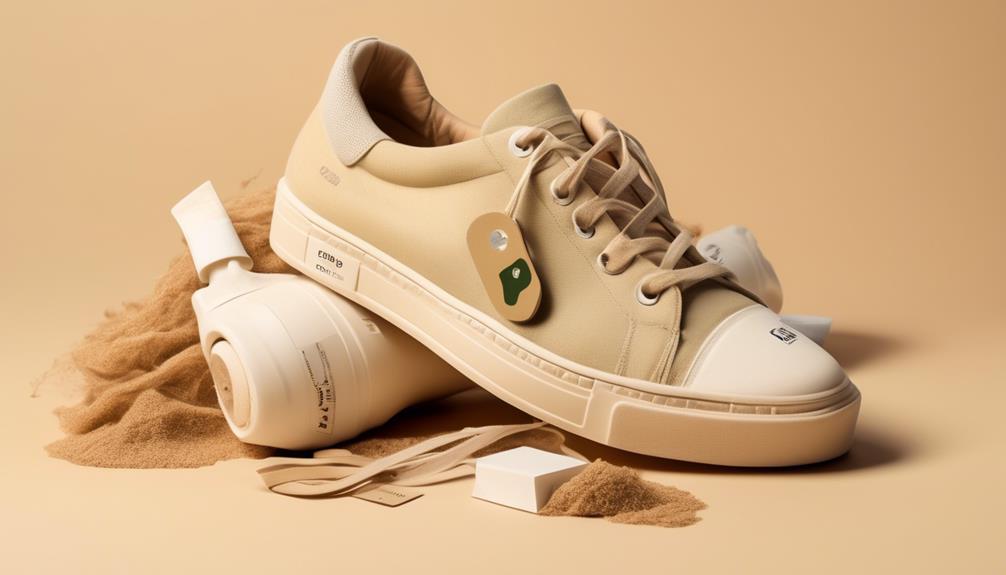What Eco-Friendly Fashion Choices Support a Greener Planet?
If you've ever wondered how your fashion choices can positively impact the planet, consider this: by choosing clothing made from organic cotton, you can significantly reduce the use of harmful pesticides and chemicals in the environment.
But that's just the beginning. There are numerous other eco-friendly fashion choices that not only support a greener planet but also promote ethical and sustainable practices throughout the entire supply chain.
From upcycled materials to zero-waste design, the options are diverse and impactful. As you explore these choices, you'll uncover the many ways in which fashion can be a force for positive change, leaving you with a newfound appreciation for the power of your clothing decisions.
Organic Fabrics
When choosing eco-friendly fashion, opt for clothing made from organic fabrics to reduce environmental impact and support sustainable practices. Organic fabrics are derived from natural fibers such as cotton, hemp, and bamboo, which are produced through sustainable agriculture. These textiles are biodegradable, meaning they can naturally decompose without harming the environment, unlike synthetic materials.
Additionally, organic fabrics are often dyed using eco-friendly dyes, which are free from harmful chemicals and minimize water pollution.
Sustainable agriculture practices used in the production of organic fabrics prioritize soil health, water conservation, and biodiversity. By avoiding synthetic pesticides and fertilizers, organic farming reduces the overall environmental impact and promotes a healthy ecosystem. Natural fibers like cotton and hemp also require less water to grow compared to their conventional counterparts, further contributing to water conservation efforts.
Furthermore, the use of eco-friendly dyes in the coloring of organic fabrics minimizes the release of toxic substances into the environment. These dyes are made from natural sources such as plants and minerals, reducing the pollution of waterways and ecosystems. By choosing clothing made with organic fabrics and eco-friendly dyes, you actively support the reduction of chemical exposure for both the environment and the workers involved in the textile industry.
Upcycled Materials
By choosing upcycled materials for your fashion choices, you can further reduce your environmental impact and contribute to a more sustainable clothing industry. Creative upcycling methods breathe new life into discarded materials, transforming them into stylish, eco-friendly fashion pieces.
Here are a few reasons why upcycled materials are a great choice for the environmentally conscious fashionista:
- Unique Style: Upcycled materials offer a one-of-a-kind appeal, allowing you to stand out with fashion pieces that are truly unique and distinctive.
- Waste Reduction: By utilizing upcycled materials, you're helping to divert waste from landfills and reduce the environmental burden of textile production.
- Resource Conservation: Choosing upcycled materials supports the conservation of resources such as water, energy, and raw materials that are typically used in conventional textile manufacturing.
- Environmental Impact: The use of upcycled materials significantly reduces the carbon footprint associated with fashion production, contributing to a more sustainable and eco-friendly industry.
Ethical Production
You can ensure ethical production by carefully researching and supporting fashion brands that prioritize fair labor practices and sustainable manufacturing processes. Look for brands that use ethically sourced materials and have transparent supply chains. Ethically sourced materials ensure that the workers involved in producing the fabrics and materials are treated fairly and paid a living wage. Transparent supply chains allow you to trace the journey of the garment from its creation to the store, ensuring that no unethical labor practices were involved.
Supporting brands that prioritize fair labor practices means choosing companies that provide safe working conditions, fair wages, and reasonable working hours for their employees. Look for certifications such as Fair Trade or certifications from organizations like the Global Organic Textile Standard (GOTS) to ensure that the products are made with respect for people and the planet.
Sustainable manufacturing processes involve minimizing environmental impact by using eco-friendly materials, reducing waste, and implementing energy-efficient practices.
When you make conscious choices to support brands that value ethical production, you're contributing to a greener and more sustainable fashion industry. By demanding transparency and ethical practices from fashion companies, you're encouraging positive change within the industry. Your choices have the power to shape the future of fashion towards a more ethical and environmentally friendly direction.
Slow Fashion Movement
Shifting your focus from supporting brands that prioritize fair labor practices and sustainable manufacturing processes, you can now explore the principles of the slow fashion movement. This movement is all about sustainable consumption and creating an eco-friendly wardrobe that benefits both you and the planet.
Here are a few compelling reasons why you should consider embracing the slow fashion movement:
- Quality Over Quantity: Slow fashion encourages you to invest in high-quality, timeless pieces that are designed to last, rather than constantly purchasing trendy, disposable clothing.
- Ethical Production: By supporting slow fashion, you're contributing to the promotion of fair labor practices and responsible manufacturing, which ultimately reduces the environmental impact of the fashion industry.
- Minimalism and Versatility: Embracing slow fashion often means simplifying your wardrobe, focusing on versatile pieces that can be mixed and matched, reducing the need for excessive consumption.
- Environmental Impact: Slow fashion promotes eco-friendly wardrobe choices, such as clothing made from sustainable materials, natural dyes, and recycled fabrics, which significantly reduces the environmental footprint of your fashion choices.
Zero-Waste Design
Exploring zero-waste design in fashion involves reimagining traditional garment construction methods to minimize or eliminate textile waste. This approach focuses on creating clothing patterns that utilize fabric in its entirety, leaving no scraps or offcuts behind. By embracing zero-waste design, fashion brands can significantly reduce their environmental footprint.
Sustainable textiles play a crucial role in achieving zero-waste design. Utilizing fabrics made from recycled materials or natural fibers that have been responsibly sourced contributes to the overall sustainability of the garment. Additionally, incorporating circular fashion economy principles into zero-waste design further enhances its eco-friendly impact. This involves designing garments with the intention of extending their lifecycle through repair, reuse, and recycling.
By prioritizing zero-waste design, fashion enthusiasts like yourself can support a greener planet by consciously choosing clothing items that have been created with minimal environmental impact in mind. Embracing zero-waste design not only reduces the amount of textile waste ending up in landfills but also promotes a more sustainable and ethical approach to fashion production.
Vegan Fashion Options
Consider incorporating vegan fashion options into your wardrobe to support sustainable and cruelty-free clothing choices. When it comes to vegan fashion, there are a variety of cruelty-free alternatives and plant-based textiles that not only look and feel great but also align with your ethical and environmental values.
Here are some compelling reasons to explore vegan fashion:
- Innovative Materials: Discover the world of innovative materials such as pineapple leather, cork, and recycled polyester that offer stylish and sustainable alternatives to traditional animal-derived fabrics.
- Ethical Manufacturing: Embrace brands that prioritize ethical manufacturing processes, ensuring that no animals are harmed in the making of their products and that workers are treated fairly.
- Versatile Styles: Explore the diverse range of vegan fashion options, from casual wear to formal attire, ensuring that you can express your personal style without compromising your values.
- Environmental Impact: By choosing plant-based textiles, you can significantly reduce the environmental impact of your wardrobe, as these materials often require fewer resources and produce fewer emissions compared to traditional fabrics.
Sustainable Footwear

If you're looking to expand your eco-friendly fashion choices beyond clothing, sustainable footwear offers another opportunity to support ethical and environmentally conscious practices.
When searching for sustainable footwear, look for options with biodegradable soles and recycled laces. Biodegradable soles are made from materials that break down naturally, reducing the environmental impact once the shoes reach the end of their life cycle. These soles can be made from materials such as natural rubber, cork, or plant-based plastics, ensuring that they can easily decompose without leaving behind harmful microplastics.
Additionally, choosing footwear with recycled laces helps reduce the demand for new materials, diverting waste from landfills and lessening the reliance on virgin resources.
Many sustainable footwear brands are prioritizing the use of biodegradable soles and recycled laces, offering stylish and environmentally friendly options for conscious consumers. By opting for shoes with biodegradable soles and recycled laces, you can actively contribute to the reduction of environmental pollution and resource depletion.
Furthermore, supporting these eco-conscious footwear choices can encourage more brands to adopt sustainable practices and invest in materials that minimize their environmental footprint.
Whether you're in the market for sneakers, sandals, or boots, consider seeking out sustainable footwear options that incorporate biodegradable soles and recycled laces to promote a greener and more sustainable planet.
Fair Trade Accessories
When seeking eco-friendly fashion options, prioritize incorporating fair trade accessories into your wardrobe to support ethical and sustainable practices. Fair trade accessories not only contribute to a greener planet but also promote the welfare of artisans and communities.
Here are some compelling reasons to choose fair trade accessories:
- Handmade Jewelry: Opt for unique, handcrafted jewelry pieces made by skilled artisans using sustainable materials. These pieces often showcase traditional craftsmanship and support local communities.
- Artisanal Handbags: Consider investing in artisanal handbags that are ethically made, often using eco-friendly materials such as organic cotton or sustainably sourced leather. These bags aren't only stylish but also support fair wages and safe working conditions for the artisans.
- Empowerment of Artisans: By choosing fair trade accessories, you're contributing to the empowerment of artisans, especially women, by providing them with opportunities for economic independence and skill development.
- Environmental Impact: Fair trade accessories are often produced using sustainable practices, minimizing environmental impact. This includes using natural dyes, recycled materials, and reducing carbon emissions in production processes.
Incorporating fair trade accessories into your fashion choices allows you to make a positive impact on both the environment and the lives of the individuals who create these beautiful pieces. By supporting fair trade, you're promoting a more ethical and sustainable fashion industry while adding unique and meaningful accessories to your wardrobe.
Frequently Asked Questions
How Can Eco-Friendly Fashion Choices Impact the Overall Health of the Planet?
Making eco-friendly fashion choices impacts the planet's health by supporting sustainable sourcing and reducing your carbon footprint. By opting for sustainable materials and ethical production, you contribute to a greener, healthier planet.
What Are Some Innovative Ways That Designers Are Incorporating Upcycled Materials Into Their Fashion Lines?
To incorporate upcycled materials into their fashion lines, designers are getting creative with innovative designs and sustainable materials. They're turning discarded fabrics and objects into stylish, eco-friendly pieces, reducing waste and supporting a greener planet.
How Can Consumers Ensure That the Clothing They Purchase Is Ethically Produced?
When buying clothes, make sure to look for ethical sourcing and sustainable materials. Check for certifications like Fair Trade or organic labels. Research the brand's transparency and commitment to workers' rights and environmental impact.
What Are Some Challenges That the Slow Fashion Movement Faces in Gaining Widespread Acceptance?
To gain widespread acceptance, the slow fashion movement faces challenges in public perception and consumer education. Changing mindsets about consumption and educating buyers about sustainable practices are crucial for the movement's success.
How Can Zero-Waste Design Principles Be Applied to Fashion and Clothing Production?
To apply zero-waste design in fashion, start with sustainable sourcing for materials and embrace circular economy practices. By minimizing waste at every stage, from production to end use, you can support a greener planet through eco-friendly fashion choices.
Conclusion
When you make eco-friendly fashion choices like opting for organic fabrics, upcycled materials, and sustainable footwear, you're supporting a greener planet.
By choosing ethical production and fair trade accessories, you're contributing to a more sustainable fashion industry.
Embracing the slow fashion movement and zero-waste design, as well as choosing vegan fashion options, can also make a positive impact.
Every small eco-friendly choice you make adds up to a more sustainable future for our planet.
